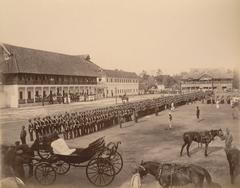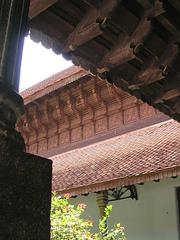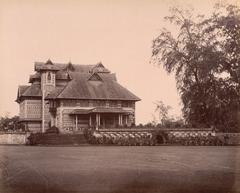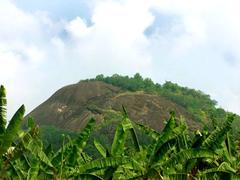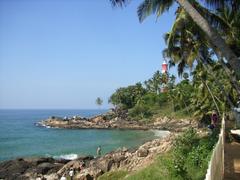Visiting St. Mary Queen of Peace Basilica, Thiruvananthapuram: Hours, Tickets, and Travel Guide
Date: 04/07/2025
Introduction
St. Mary Queen of Peace Basilica in Palayam, Thiruvananthapuram, stands as a beacon of spiritual heritage and architectural beauty, integral to Kerala’s Christian and cultural landscape. Established in 1933 by Archbishop Mar Ivanios as the first cathedral of the Syro-Malankara Catholic Church, the basilica was elevated to Minor Basilica status in 2008. With its remarkable blend of Kerala and Syro-Malankara architectural styles, profound Marian devotion, and a vibrant community presence, the basilica draws both pilgrims and cultural travelers. This guide offers a comprehensive overview of its history, significance, visitor logistics, and essential travel tips to ensure a meaningful experience (Malankaracatholicchurch.in, GCatholic.org, Pilgrim Info).
Table of Contents
- Historical Overview
- The Syro-Malankara Catholic Church: Tradition & Identity
- Why Visit the Basilica?
- Architectural and Artistic Highlights
- Religious and Cultural Significance
- Community Outreach and Social Initiatives
- Visiting Hours, Tickets & Accessibility
- Tips for Visitors
- Rituals, Festivals, and Major Events
- Notable Figures
- Nearby Attractions
- Frequently Asked Questions (FAQs)
- Resources & Further Reading
Historical Overview
St. Mary Queen of Peace Basilica was established in 1933 as the spiritual home for the newly reunited Syro-Malankara Catholic community. Initially a simple “Tin Church” (Thakara Palli), it quickly became the first cathedral of the Syro-Malankara Catholic Church. The basilica was elevated to its current status by papal decree in 2008, and underwent a significant renovation in 2019, enhancing its role as a major pilgrimage site (Malankaracatholicchurch.in, GCatholic.org).
The Syro-Malankara Catholic Church: Tradition & Identity
Rooted in the apostolic tradition of St. Thomas Christians, the Syro-Malankara Catholic Church follows the West Syriac Rite, blending Syriac and Malayalam in its liturgy. It is led by the Major Archbishop-Catholicos and has a global presence serving the Malankara diaspora. The basilica remains a central symbol of unity and faith for this community (Malankaracatholicchurch.in).
Why Visit the Basilica?
- Spiritual Destination: A revered Marian shrine and a center for pilgrimage.
- Cultural Landmark: Showcases Kerala’s religious harmony—situated near a Hindu temple and a mosque.
- Architectural Marvel: Combines Kerala and Syrian Christian elements in design and iconography.
- Community Hub: Engages in education, charity, and social justice.
Architectural and Artistic Highlights
Exterior and Surroundings
The basilica’s façade is serene, adorned with arched windows, pastel hues, and religious inscriptions in multiple languages symbolizing peace (“Shalom”). A prominent statue of the Virgin Mary welcomes visitors. The landscaped grounds create a tranquil oasis amidst city life. Its proximity to the Sree Shakti Vinayaka Temple and Juma Masjid exemplifies Kerala’s interfaith harmony (Pilgrim Info).
Interior Design and Sacred Spaces
The spacious nave, high ceilings, and well-lit sanctuary inspire reverence. The main altar, richly decorated, features icons and motifs blending Eastern and Western Christian artistic traditions. Side chapels, stained glass windows, and inscriptions in multiple languages enhance the spiritual ambiance. The church has also hosted the mortal remains of significant Syro-Malankara leaders during public veneration (Catholic Shrine Basilica).
Art, Iconography, and Symbolism
The basilica boasts stained glass windows depicting Marian and biblical scenes, ornate liturgical furnishings, and icons in the unique Syro-Malankara style. Multilingual inscriptions and recurring peace motifs reinforce its dedication to the Queen of Peace. The architecture and art collectively symbolize the church’s commitment to unity and harmony (Pilgrim Info).
Religious and Cultural Significance
The basilica is a hub for Marian devotion and spiritual renewal, especially during the annual Feast of St. Mary in September. It serves as a focal point for liturgical celebrations, community gatherings, and is integral to Kerala’s Christian heritage, embodying a dynamic interplay of faith and culture (GCatholic.org).
Community Outreach and Social Initiatives
Beyond religious functions, the basilica is deeply involved in education, healthcare, and charity. It supports local schools, social programs, and disaster relief, reflecting its commitment to holistic community development. Youth programs, counseling, and outreach foster belonging and spiritual growth.
Visiting Hours, Tickets & Accessibility
- Hours: Open daily from 6:00 AM to 8:00 PM (subject to special event changes).
- Entry: Free for all; donations are welcome.
- Accessibility: Wheelchair accessible, with ramps and accessible restrooms.
- Facilities: Restrooms, limited parking, and a parish office. Public transport is highly recommended due to central location (Pilgrim Info, yappe.in).
Tips for Visitors
- Dress modestly; shoulders and knees covered.
- Remove footwear before entering prayer halls.
- Photography permitted in non-liturgical areas; flash and tripods are restricted.
- Visit during early mornings or late afternoons for a peaceful experience.
- Annual feast days provide a vibrant cultural and spiritual encounter.
- Plan your visit around local festivals and check basilica events in advance.
Rituals, Festivals, and Major Events
- Annual Feast: Held in September, featuring special liturgies, processions, and cultural events.
- Holy Week, Christmas, Easter: Marked by solemn celebrations.
- Daily Mass and Novenas: Visitors are welcome to join.
- Special Devotions: Regular Marian devotions and community prayers (GCatholic.org).
Notable Figures
- Archbishop Mar Ivanios: Founder and leader of the reunion movement.
- His Beatitude Moran Mor Baselios Cardinal Cleemis: Major Archbishop-Catholicos, instrumental in the basilica’s elevation and modern growth.
Nearby Attractions
- University of Kerala Senate House Campus: Colonial-era architecture.
- Palayam Market: Local shopping and city life.
- Trivandrum Zoo and Napier Museum: Cultural and family sites.
- Sree Shakti Vinayaka Temple & Juma Masjid: Symbols of religious harmony.
- Kanakakkunnu Palace: Heritage site (Kerala Tourism).
Frequently Asked Questions (FAQs)
Q: What are the visiting hours?
A: 6:00 AM to 8:00 PM daily. Hours may vary during festivals.
Q: Is there an entry fee?
A: No. Entry is free for all; donations are voluntary.
Q: Are guided tours available?
A: While not regularly scheduled, arrangements can be made through the parish office or local operators.
Q: Is the basilica wheelchair accessible?
A: Yes.
Q: What is the dress code?
A: Modest attire required; remove footwear before entering prayer halls.
Q: Are special events open to the public?
A: Yes, especially during annual feasts and major liturgical celebrations.
Resources & Further Reading
- St. Mary Queen of Peace Basilica – Official Site
- GCatholic.org: Basilica Details
- Pilgrim Info: Visitor Guide
- Yappe.in: Traveller Reviews
- Kerala Tourism Official Site
Conclusion & Travel Recommendations
St. Mary Queen of Peace Basilica is more than a church—it is a living testament to Kerala’s Christian heritage, architectural brilliance, and cultural pluralism. Its welcoming atmosphere, spiritual richness, and accessible location make it a must-visit for pilgrims, culture seekers, and tourists alike. Visit during a major feast for a full cultural experience, or enjoy the tranquility of regular days. For an enriched visit, consider using official resources, guided tours, and travel apps like Audiala for audio guides and event updates.
For more articles and tips on Thiruvananthapuram’s heritage sites, download the Audiala app and follow us on social media. Embrace the harmony of faith, art, and culture at this Kerala landmark!
References:
